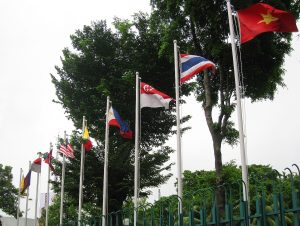Yesterday, Reuters published a report offering new details about Indonesia’s efforts to rally the Association of Southeast Asian Nations (ASEAN) to take a more active role in the unfolding political crisis in Myanmar.
Citing three officials familiar with the Indonesian scheme, Reuters revealed that Jakarta is pushing fellow ASEAN members to agree on an action plan that would hold Myanmar’s junta to its promise of holding elections in a year’s time, deploy monitors to ensure that they are fair and inclusive, and hold a special ASEAN summit to address the country’s crisis. The Indonesian plan, the report claims, also calls for ASEAN to facilitate dialogue between the junta and the burgeoning anti-coup protest and civil disobedience movement.
The Myanmar military’s seizure of power on February 1 has created a complex challenge for the 10-nation Southeast Asian bloc, which wants other powers to respect its position of “centrality” in Asian diplomacy, but is often sluggish at responding to regional challenges.
The report came after Indonesian Foreign Minister Retno Marsudi paid visits last week to Brunei and Singapore to rally support for more concerted regional action on the situation in Myanmar. On Tuesday, Retno made a call for an “inclusive democratic transition” that respects “the wishes of the Myanmar people.” She also said that the “well-being and security of the Myanmar people is the number one priority,” and called for all parties to “deploy maximum restraint to avoid bloodshed.”
As detailed by Reuters, the ASEAN plan on Myanmar sidesteps the forthright condemnations that have emanated from Western capitals in the aftermath of the coup. The European Council yesterday put out a statement calling for the release of Aung San Suu Kyi and the reinstatement of her government, asserting that “the EU stands with the Burmese people.” This echoed comments by U.S. Secretary of State Antony Blinken, who tweeted on the weekend, “We stand with the people of Burma.”
The plan also falls short of the demands of protesters, which include not just the immediate reversal of the coup and the recognition of the National League for Democracy (NLD)’s landslide victory at the election held in November, but also, in some quarters, calls for the scrapping of the military-drafted 2008 Constitution and the creation of an inclusive federal democracy. Indeed, this morning protesters gathered outside the Indonesian Embassy in Yangon to voice their displeasure with Jakarta’s perceived half-measures.
Perhaps for this reason, an Indonesian Foreign Ministry spokesperson said Tuesday that Jakarta was not seeking new elections, implying that it would press for the junta to respect the result of the November election.
Whatever the government’s policy – and it is possible that the Indonesia is pursuing one policy of its own, and another more pragmatic strategy through ASEAN – the Reuters report carries the sensible implication that a diplomatic solution has to focus first of all on forestalling further bloodshed, especially given the increasingly tense situation on the streets. Then ASEAN can potentially push the military either to hand over power to the NLD in line with November’s result (less likely) or to honor its commitment to hold a new election and hand power to the winner (more likely, but still not guaranteed).
Either way, an important element of a diplomatic solution to the crisis will be to offer the new junta a chance to stage a return to the status quo ante without risking a serious loss of face. As the current wave of protests shows, the Tatmadaw has clearly underestimated the depths of its own unpopularity, and may welcome, if ASEAN couches the language just so, a diplomatic roadmap that allows it gracefully to extract itself from its present, self-excavated hole.
But any ASEAN action on Myanmar faces a number of immediate hurdles. The first is the bloc’s operating principles of consensus decision-making and “non-interference,” which could preclude any forceful action on Myanmar. While ASEAN has in the past shown a good deal of flexibility on its interpretation of “non-interference” – a definitionally elastic concept – gaining the requisite consensus for intervention among the region’s elites, to say nothing of the cooperation of Myanmar’s prickly junta, remains a stiff challenge.
Two senior officials told Reuters that persuading Myanmar to participate in the proposed ASEAN special summit is already proving difficult. To effectively ensure that the military government’s planned elections are free and fair, the Indonesian plan would also require some guarantees beyond on-the-spot election monitoring. This would have to extend to the questions of which parties will be permitted to take part, and under what conditions, given the military’s likely tilting of the electoral playing field further in its own direction.
In terms of diplomatic paths out of the present tangle, however, an ASEAN-led solution probably stands a better chance of succeeding than a new campaign of economic sanctions, however well they are calibrated to avoid hurting the Myanmar people. One official told Reuters that concrete progress depended on engaging with the Tatmadaw, something that Southeast Asian nations are perhaps best placed to initiate. As the official said, “This is our family so our approach will be different.”
If the diplomatic stars align at just the right angle, ASEAN has a chance of salvaging the good from the ruins of the perfect in Myanmar. Needless to say, the outcome would be less then fully democratic, amounting at best to a resurrection of the previous status quo. But given the sorry turn of events in Myanmar, something along these lines is probably the best that can be expected in the current circumstances.

































